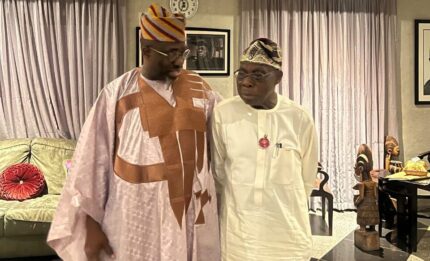Former President Olusegun Obasanjo has come under fire from a chieftain of the Peoples Democratic Party (PDP), Olusegun Showunmi, for his consistent public criticisms of Nigerian presidents who succeeded him. Speaking on Channels Television’s political program Political Paradigm, Showunmi expressed his astonishment at what he described as the hypocritical tendencies of the former president. He argued that if Nigeria were a country of true accountability, Olusegun Obasanjo’s tenure would have been scrutinized rigorously for the numerous alleged irregularities that occurred under his watch.
Showunmi highlighted that during Olusegun Obasanjo’s presidency, there were widespread allegations of corruption that were left unchecked and unresolved. Instead of adopting a sanctimonious stance, Showunmi suggested that Obasanjo should focus on addressing the questionable practices that tainted his time in office. He asserted that Olusegun Obasanjo’s approach of writing public letters to criticize presidents like Umaru Musa Yar’Adua, Goodluck Jonathan, and Muhammadu Buhari reflects an attempt to control their actions and force them to align with his views.
Allegations of Tyrannical Leadership During Obasanjo’s Era
Showunmi did not hold back in his criticism of Olusegun Obasanjo’s leadership style, labeling it as tyrannical and manipulative. He accused the former president of orchestrating some of the undemocratic practices that have plagued Nigeria’s political landscape. One notable example, according to Showunmi, was Olusegun Obasanjo’s treatment of party leadership and the legislature. During his tenure, he reportedly removed party chairmen at will, thereby undermining the authority and independence of the political party system.
Additionally, Olusegun Obasanjo was alleged to have rendered the legislative arm of government ineffective, turning it into a “toothless bulldog.” These practices, Showunmi claimed, set a precedent that has continued to influence Nigeria’s democracy negatively. He emphasized that Olusegun Obasanjo’s actions demonstrated an attempt to consolidate power and establish an emperor-like status, leaving a legacy of weakened democratic institutions.
Criticism of Obasanjo’s Letters to Successors
Showunmi also criticized Obasanjo’s penchant for addressing his grievances with Nigeria’s leadership through open letters. According to him, this approach is not only unnecessary but also reflects Obasanjo’s desire to remain a dominant figure in Nigeria’s political discourse. He accused the former president of using these letters to impose his will on his successors and portray himself as a moral authority on governance.
For Showunmi, these public criticisms lack credibility, given Obasanjo’s own controversial record in office. He argued that the former president’s actions reveal a lack of respect for the democratic process and an unwillingness to allow subsequent leaders to govern independently. Showunmi called on Nigerians to critically examine Olusegun Obasanjo’s tenure and question his motives, rather than accept his public critiques at face value.
The Need for Accountability in Nigerian Politics
Showunmi urged Nigerians to hold all leaders accountable, including former presidents like Olusegun Obasanjo. He stressed that no leader should be allowed to rewrite history or evade scrutiny for their actions while in office. According to Showunmi, fostering a culture of accountability is crucial for strengthening Nigeria’s democracy and ensuring that no individual is above the law.
He added that Olusegun Obasanjo’s criticisms should serve as a reminder of the importance of transparency and accountability in governance. Rather than engaging in public theatrics, Showunmi suggested that Obasanjo and other former leaders should contribute to Nigeria’s progress by supporting efforts to build strong institutions and promote good governance. Social Media Reacts to Showunmi’s Remarks
Showunmi’s critique of Obasanjo sparked widespread debate on social media platforms, with Nigerians sharing mixed reactions. A user with the handle @Beerhoria wrote, “Chai! Is this the same Obasanjo that some people see as the best thing to have happened to Nigeria’s democracy? Showunmi is tearing him apart!” Similarly, @Folorunsho tweeted, “Segun Showunmi nailed it. Aptly put.”
However, the criticism did not end there. @Peacemaker noted, “Obasanjo had more than enough opportunity to repair this country, but instead, he changed everything to benefit himself. He’s the one who put us in this situation.” Another user, @TayoAdunni, shared a harsher perspective: “As someone who remembers the 1999 Obasanjo regime, I can confidently say he is far from being a good leader. His loquaciousness now only exposes his failings.”
Obasanjo’s Democratic Legacy Under Scrutiny
Obasanjo’s presidency (1999–2007) has long been regarded as a pivotal era in Nigeria’s democratic evolution. However, critics like Showunmi argue that his leadership style undermined the very democracy he claimed to protect. From allegations of widespread corruption to accusations of centralizing power, Obasanjo’s tenure remains a contentious topic in Nigeria’s political discourse.
While Obasanjo has received praise for initiatives such as debt relief and economic reforms, Showunmi’s comments reflect a growing segment of Nigerians who question the former president’s legacy. Whether these critiques lead to a broader reassessment of Obasanjo’s contributions or remain isolated grievances, the debate underscores the complexities of evaluating leadership in Nigeria’s evolving democracy.
Table of Contents
Discover more from OGM News NG
Subscribe to get the latest posts sent to your email.














